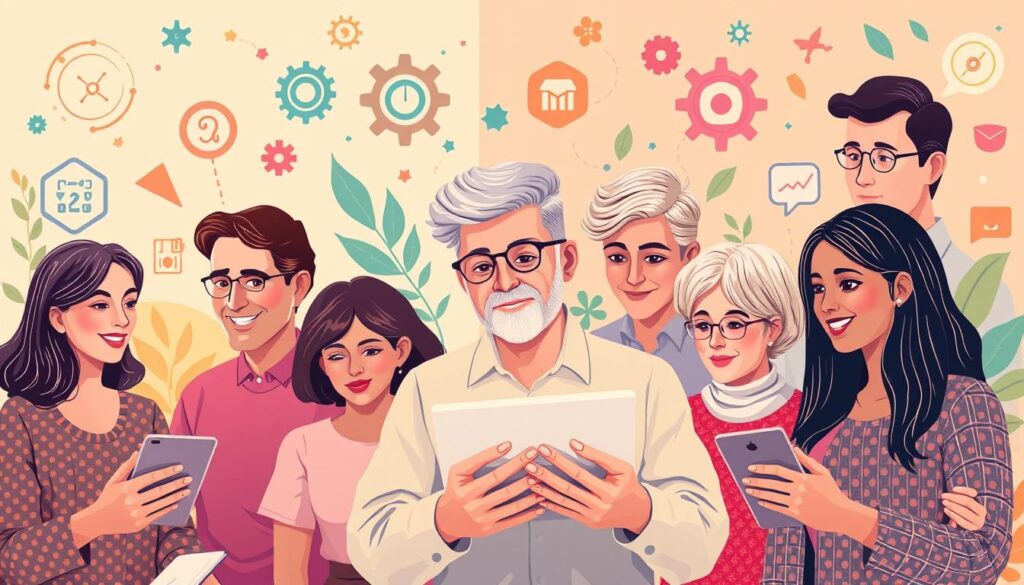Could artificial intelligence (AI) be the answer for better well-being and social connections for midlife professionals? As AI gets better, it could really help those in their prime years. It offers a chance for growth, better emotional skills, and strong relationships.
Discover how AI can change mental health, help with life changes, and improve social connections in this detailed article.
Impact of AI on Mental Health and Wellbeing
The COVID-19 pandemic has made mental health a big concern. Studies show more people are dealing with anxiety, depression, and stress. It’s vital to focus on mental and social health, especially for midlife professionals. They face big challenges in balancing work and personal growth.
Prevalence of Mental Health Issues During the Pandemic
A study looked at 20,311 people and found the pandemic really affected their mental health. It used a tool called “My Wellness Check” with almost 30,000 students and staff over two years.
Importance of Psychological and Social Well-being
A web-based program helped improve mental health and well-being in a study. It had 969 participants from Norway. The program made people happier with their lives and boosted positive feelings and overall well-being.
AI tools can offer personalized support to help with mental health and well-being. They can guide people through the tough times of the pandemic. This helps with their mental and social health, and emotional intelligence.
AI for Midlife Well-being and Social Thriving
As professionals face midlife changes and challenges, AI can be a big help. It uses natural language processing, emotional intelligence, and data analysis. This helps provide personalized advice, track progress, and build strong connections. It makes handling life changes easier and more confident.
AI can be a great friend during midlife. It helps you check your career goals, re-evaluate relationships, or grow personally. These systems look at your situation, suggest ways to handle stress, and connect you with others. This supports your social thriving and personal growth.
Using AI, you can better understand and manage midlife’s challenges. These advanced technologies boost your emotional intelligence and support during life transitions. They help you improve your well-being and do well at this important time in your life and career.
Benefits of Embracing AI in Midlife
As you move through midlife, using artificial intelligence (AI) can bring big benefits to your career and well-being. AI helps you work smarter, not harder. It lets you focus on what makes you special.
Enhancing Career Productivity with AI
AI tools can change how you work for the better. They handle tasks like research and data analysis automatically. This means you can spend more time on important tasks like strategy and emotional intelligence. These are skills only humans have, and they’re crucial for moving forward in your career and feeling fulfilled.
The Irreplaceable Value of Human Interaction
AI can make work easier, but nothing beats human interaction and social connection. Finding a balance between AI’s efficiency and human insight is key. It helps you build a strong midlife career and a supportive social network. These are vital for your happiness and productivity.
Using AI in midlife isn’t about replacing what humans do best. It’s about using technology to boost your strengths. By blending AI into your life, you can achieve more in your career and connect with others on a deeper level. This way, you can excel in midlife and beyond.
Personal Branding in the AI Era
In today’s world, having a strong personal brand is key for midlife professionals. With AI changing the job scene, having a brand that shows off your skills and what you bring to the table is vital. It helps you stand out and move forward in your career.
Midlife folks can use their knowledge and human touch to work with AI’s strengths. This approach makes you more visible and sought after in your field. Personal branding in the AI age means showing off your expertise, getting more visibility, and pushing your career advancement.

Articles say AI tools like ChatGPT make work easier and faster, cutting tasks in half. Using AI can boost your personal branding efforts. It helps you manage tasks better, get new insights, and tell a stronger professional story. This way, you’re ready to succeed in the AI era and advance your career.
AI-powered Mental Health Interventions
In today’s fast-paced world, keeping up with emotional health is key, especially for midlife professionals. They face a lot of stress from work and personal life. Luckily, AI-powered mental health tools are here to help. They offer solutions to support and empower people at this important life stage.
Internet-Based Cognitive-Behavioral Therapy
One AI-driven method is internet-based cognitive-behavioral therapy (iCBT). It mixes the success of cognitive-behavioral therapy with online access. iCBT uses machine learning to create personalized treatment plans for each user. This makes mental health support more accessible to those who can’t get traditional therapy.
Self-Help Interventions with AI Guidance
AI is also changing self-help in mental health. These tools help people take control of their emotional health. They offer personalized advice and resources. Through AI, these programs can analyze user data and give tailored advice, even chatting to help with self-reflection.
These AI tools blend tech with mental health expertise. They help midlife professionals manage their emotions better. As AI and mental health grow together, the chance to improve well-being at individual and community levels is exciting.
AI in Healthcare and Biomarker Discovery
The healthcare industry is changing fast, thanks to AI. AI is making big changes in medical imaging and diagnosis. It helps doctors make better decisions by analyzing lots of data quickly.
This means we can find health problems sooner and treat them better. AI helps make treatment plans that fit each patient’s needs.
AI for Medical Imaging and Diagnosis
AI is changing how we look at medical images like X-rays and MRI scans. It can spot things we might miss. This leads to quicker and more accurate diagnoses.
This is good news for patients and can save money on healthcare costs.
AI for Aging Biomarker Development
AI is also key in finding biomarkers for aging. It looks at genetics, lifestyle, and health history to understand aging better. This helps create treatments to keep midlife professionals healthy longer.

As AI gets better, its role in healthcare and biomarker discovery will grow. By using AI, healthcare workers and midlife people can aim for a future of personalized healthcare. This will lead to better health and quality of life for everyone.
Designing AI for Community Wellbeing
Making AI systems that help communities feel good needs a full, people-focused plan. This plan uses AI theory and cybernetic thinking. By seeing AI as a smart feedback loop, designers can make systems that check and answer the changing needs of groups. This includes midlife professionals.
AI Theory and Cybernetic Thinking
Understanding how AI works is key to making it help communities. AI theory and cybernetic thinking help make systems that change to meet the mental, social, and emotional needs of people and groups. Seeing AI as a process that keeps adjusting helps designers make solutions that keep getting better at helping people.
Community-Led Design Approach
A community-led design approach is vital for making AI that really fits the people it’s for. This participatory design method gets users involved from the start. It makes sure the AI meets the real needs and values of the community. By letting midlife professionals help make the technology, designers build trust and make a bigger impact.
Using human-centered design and community-led development is key for AI that really helps midlife professionals. By mixing tech know-how with understanding the community, designers can make new solutions. These solutions tackle the special challenges and hopes of this group.
Conclusion
AI and midlife well-being go hand in hand, offering chances for growth and emotional smarts. It helps midlife workers be more productive and connect deeply with others. AI also boosts mental health, healthcare, and community support.
As AI gets better, midlife folks should get involved with these tech tools. They can use AI to handle life changes, make new friends, and enjoy their best years. AI opens doors to more personal growth, emotional smarts, and community ties, making midlife better.
This article shows how AI can really help with midlife happiness and social life. By mixing AI with human strengths, you can create a future where tech and personal growth work together. This helps you face midlife challenges with more strength, purpose, and friends.
